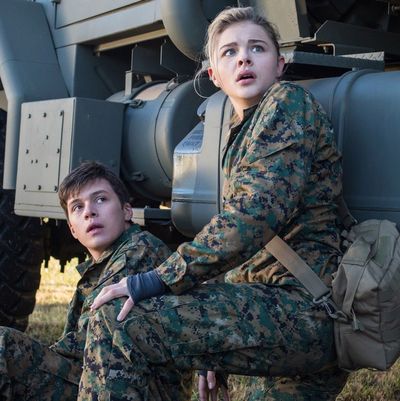
“Pumpkin, there’s nothing safe anymore.” That’s what calmly downcast Oliver Sullivan (Ron Livingston) tells his teenage daughter, Cassie (Chloë Grace Moretz), partway through the new young-adult dystopian sci-fi The 5th Wave, and it’s a good example of the kind of very thin, deadly line the film tries to walk. It’s a movie not just about losing one’s innocence (that’s what all YA books and movies are about these days) but about soft centers and hard shells — about the cute colliding with the cruel. That “pumpkin” makes the line ridiculous, but it’s also the word that sells the overall conceit of a seeming lyordinary girl’s life being transformed forever.
A lot of YA stories focus on characters who were outcasts or outsiders to begin with (Katniss in The Hunger Games being a prime example). Cassie, as she makes clear in The 5th Wave’s opening narration, was a middle-class high-schooler, playing soccer and going to parties and texting with her BFF and lusting secretly after hunky football players before the mysterious giant alien ships started hovering above Earth. Then the power went out, tidal waves wiped out half of humanity, and bird flu took care of the rest. When we first see Cassie in the film (before she flashes back to life as it was), she kills a bleeding man who seems to be reaching for a gun; it turns out to be a cross. That’s a hell of a thing, starting your movie with your fresh-faced teenage heroine killing an innocent, wounded man. “I miss the Cassie I was,” she tells us. “I wonder what that Cassie would think of me now. The Cassie who kills.”
For its first half-hour or so, The 5th Wave admirably conveys the contrast between the warm, nostalgic light of Cassie’s innocence and the absurdist catastrophes that befell her and humanity. Soccer practice is interrupted by buzzing phones alerting the kids and coaches to the giant ships in the sky. The ensuing apocalypse is evocative: We see London’s Tower Bridge demolished by a tidal wave; a young man stands on a terrace watching Manhattan consumed by brackish water. Characters are dismissed with grim efficiency; Cassie is quickly pulled away from her best friend as the girls look at each other from across a quarantine fence.
But gradually we lose the thread, as the world of the film begins to feel forced and cagey, like important information is being awkwardly kept away from us. The aliens, called “the Others,” are unseen, mysterious, which lends them a symbolic quality. Children, including Cassie’s young brother Sam and her secret crush Ben Parrish (Nick Robinson), are rounded up and turned into soldiers by a group of military hard-asses led by Colonel Vosch (Liev Schreiber) and Sergeant Reznick (Maria Bello). It’s like Lord of the Flies by way of Michael Bay, only not nearly as awesome as that sounds.
There is pointed symbolism all over the place, but director J Blakeson and his screenwriters (which include Erin Brockovich’s Susannah Grant and A Beautiful Mind’s Akiva Goldsman) haven’t managed to balance such thematic elements with the film’s clunky attempts at action and romance. Nor have they built on the story’s allegorical overtones: For much of the film, we feel as if we’re watching an elaborate metaphor that hasn’t been thought through entirely. (It’s possible that the best-selling novel, written by Rick Yancey, explains this stuff a bit better.)
But then, things go from disappointing to laughable. Major characters are dispatched in rushed and unconvincing fashion, as if whole plot threads have been cut out. At one point, near the end, one character shows up with what will now forever be one of my favorite lines in cinema: “I’ve been planting bombs.” I hope I’m not giving anything away (nor do I care) when I say that this sets us up for a comically explosive finale — one that, were it not for that ridiculously convenient, virtually context-free bit of stray dialogue, would be coming out of nowhere. For all the goodwill generated by its early scenes, by the time The 5th Wave lumbers to its conclusion, you realize you’re not watching a movie but an act of crisis management.





